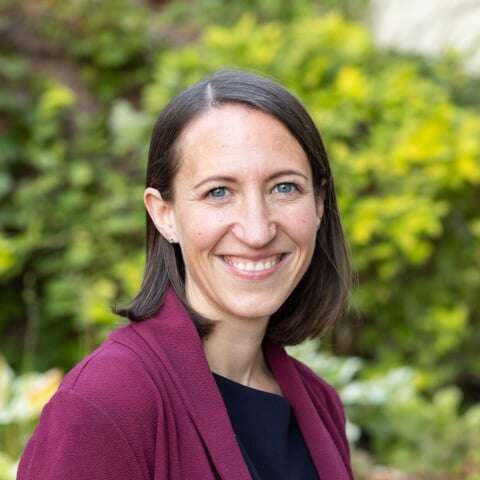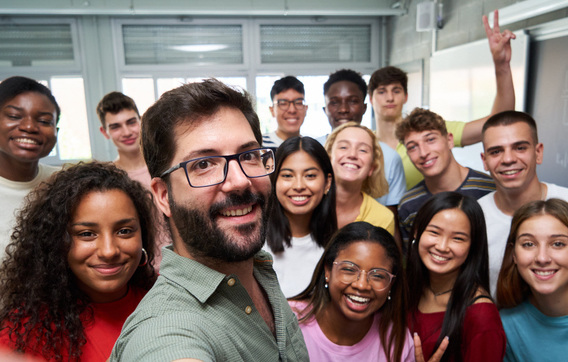More and more educators and youth-serving practitioners incorporate organizational and programmatic approaches to build youths’ social capital because embedding young people in relationship-rich environments fosters developmental relationships. Search Institute defines social capital as the resources that arise from a web of relationships, which youth can access and mobilize to help them improve their lives and achieve their goals. A robust network of support for young people to draw from can help them successfully transition to post-secondary education, find meaningful careers of their choice, and upskill to earn higher salaries.
One of the best ways educators and practitioners can support young people’s social capital is by considering the importance of youth social capital mobilization. Mobilization refers to the way relationships are accessed and used to accomplish goals. Mobilizing social capital means more than a person simply considering all the people in their social network and making a strategic decision about who they should reach out to.
Rather, youths’ social connections (e.g., family, peers, mentors) also initiate social capital mobilization and organizations can play a powerful role in activating relationships on behalf of youth. And, there are numerous ways that this collective of support can mobilize relationships. This more comprehensive view of social capital mobilization can help practitioners better understand how young people actually use relationships to enlist resources as they work toward their goals. Centering the ways in which social capital is mobilized can help practitioners understand the challenges young people face, particularly youth of color and working class youth, when trying to mobilize their social capital. Therefore, promoting social capital mobilization within your organization or school can have a profound impact for supporting equitable outcomes.
Youth Social Capital Mobilization
One key resource that articulates the different ways social capital can be personally and organizationally mobilized is Mario Small’s framework, “How Actors Mobilize Their Networks in Practice (2021)”. Educators and practitioners can apply this framework to help consider the types of support young people need to successfully access and use relationships to reach their goals. The framework offers several ways to think about how people access and use their relationships:
- Self-initiated mobilization can be thought of as the instances when young people consider their social network and make an autonomous decision to reach out to someone they believe can help them. This happens when a person is looking for a job, and they decide to reach out to a friend that works somewhere they would like to apply for employment. Gaining confidence in oneself and learning techniques to use your personal network is an important ability for young people to develop. Youth programs can teach transferable networking skills so young people can independently grow and maintain their social networks. In practice this can take many forms. For example, some youth programs teach participants to use LinkedIn to network and provide opportunities to search program educators' contact list on the platform for potential career connections they liked to be introduced to.
- Connection-initiated mobilization can be thought of as the instances when individuals in a youth’s life like program educators, peers or near-peers are the initiator of social capital mobilization. An example of this is when a friend reaches out to share a job opening at their place of employment. In youth programs, program educators or near-peers often reach out to participants to let them know about professional development, networking events, or other opportunities. For many programs, brokering connections and opportunities is an essential way they provide resources to support learners. In other programs, there may be a robust peer community in which peers exchange information about professional development, job opportunities and other valuable information. Many times social capital is mobilized by someone in a persons’ network spontaneously. This speaks to the benefits of young people being embedded in relationship-rich environments with others that have a shared ambition and a desire to pay-it-forward.
- Organizationally-driven mobilization identifies the role of organizations in social capital mobilization and can be either connection-initiated or self-initiated. The use of social capital can be supported by the structures, activities and/or incentives of organizations. For instance, a company could play an important role in why someone decided to reach out about a job opening by offering a referral bonus for new hires. In youth programs, organizations often support youth social capital mobilization through class sessions, networking events and 1:1 workshops (e.g. for resume writing support). This type of mobilization also includes organizations creating spaces for connection such as using Slack as a tool for interactions and creating a sense of community. Understanding the role of organizations in social capital mobilization can help practitioners assess if and how their program offerings influence the way participants mobilize their social capital and can help to institutionalize processes for brokering relationships and opportunities within and outside the program.
- Individually-driven mobilization indicates the occasions social capital is used without it being organizationally facilitated and, similar to organizationally driven, can also be connection initiated or self initiated. In youth programs, educators or peers will help participants in ways that fall outside of the formal structure and activities of the program. For example, this takes place when educators introduce participants to people in their personal network and help them set up informational interviews to learn about a job industry of interest. Additionally, it happens amongst peers when they decide to set up a study group or other meeting spaces outside of the program. Understanding the informal practices of educators and young people can help youth programs train new educators and/or more fully integrate effective informal practice more broadly. Additionally, programs may be able to better support and/or facilitate the informal interactions of youth participants outside of the program.
How can practitioners use this framework?
This framework can help practitioners individualize strategies to meet the needs of youth, expand the way programs teach networking skills to young people, highlight the most effective organizational roles and supports, and surface informal practices being used in isolation. This is important because young people experience and mobilize relationships differently. Additionally, young people of color may face barriers such as racism, cultural isolation in predominantly white organizations and stereotype threat that can impact their ability to build trusting relationships. Here are some strategies that practitioners can take into account as they work alongside young people to build their social capital:
More intentionally support young people. Practitioners who understand the different ways young people mobilize their social capital and the potential challenges youth experience while doing so can individualize strategies to accommodate youth’s social capital development. For example, more introverted young people may need more opportunities for connection-initiated social capital mobilization to help them feel confident in becoming the lead initiator later on. Additionally, young people that have experienced trauma and/or deficit views in previous relationships may need more time to build trusting relationships before they feel confident about their abilities to mobilize their own social capital. Practitioners would benefit from continued reflection on how the structure of their programs creates opportunities for young people to experience different types of mobilization and the characteristics of participants that may make different types of mobilization more or less effective.
Expand networking skills. Young people should also be aware that social capital mobilization can happen in different ways. Teaching young people about how social capital can be self- or connection-initiated can help them envision and build mutually beneficial relationships based on reciprocity. Additionally, it’s important for young people to understand that organizations often play a role in the use of social capital and that can influence them to find more organizations, in addition to people, that can support their ambitions. Moreover, shifting to a more comprehensive view of social capital mobilization could help young people feel part of a supportive community and reduce the feeling that it’s solely their burden to build their professional network.
Assess program offering. Researchers at Search Institute developed an assessment tool, the Social Capital Assessment + Learning for Equity (SCALE) measures, to help educational leaders and practitioners collect valid and reliable data on how their organizations help young people develop and strengthen their social capital. SCALE provides valuable, practitioner-oriented information about young people's network strength, relationship-building skills, network composition, and orientations towards networking. The social capital mobilization framework can be used in addition to program assessments by providing more details about participants’ experiences trying to utilize their social capital while highlighting the types of support that appear to be the most effective. For instance, programs could assess the relationship between participants' orientation to networking and their use of self-initiated mobilization or the relationship between network composition and opportunities that arise through connection-initiated social capital mobilization.
Moreover, practitioners can use the framework to reflect on their program offerings and how the different types of social capital mobilization work together. For instance, programs can assess if one-on-one interactions between educators and participants are a catalyst for educators to leverage their own social capital to provide additional informal opportunities (e.g. outside of program curriculum).
Move towards more equitable outcomes. An important consideration for ensuring equity in youth programs is understanding how social capital mobilization takes places across lines of race and class difference. It’s important that young people of color, and low income youth have equal access to opportunities. The social capital mobilization framework unpacks how social capital mobilization may be experienced differently based on identity and demographics. For instance, it can be used to assess if educators are more likely to provide informal opportunities to people with similar identities or if young people of color are more likely to initiate social capital if they have a shared background and/or identity with a person.
There are a number of ways young people access relationships to support their ambitions and, likewise, there are a multitude of strategies to support them. Further research is being conducted to better understand how young people use the various types of mobilization as a result of program participation and the ways programs can best support young people to mobilize social capital. Future research will also explore the ways different strategies may be more or less effective with young people dependent on their cultural and demographic identity, learning style, personality and/or way they experience relationships.
Brian Lightfoot is a Ph.D. candidate at the School of Education at the University of Colorado Boulder. His research focuses on equitable, student-centered policies, practices and institutions, and he has published resources on student activism, teacher preparation and youth social capital development. Brian is also the Co-founder and former Chief Program Officer at Formation Ventures, a youth program that supports emerging high school aged entrepreneurs of color. Additionally, he is a consultant at Franklin Street Studios, a boutique learning design studio based in Denver, Colorado that specializes in human centered design, leadership, team development and strategic planning. In all of his work, Brian focuses on authentically and systematically collaborating with students, families and communities to create spaces that build capacity and social capital. His research as one of Search Institute's 2023 Summer Scholars focused on youth social capital development.




